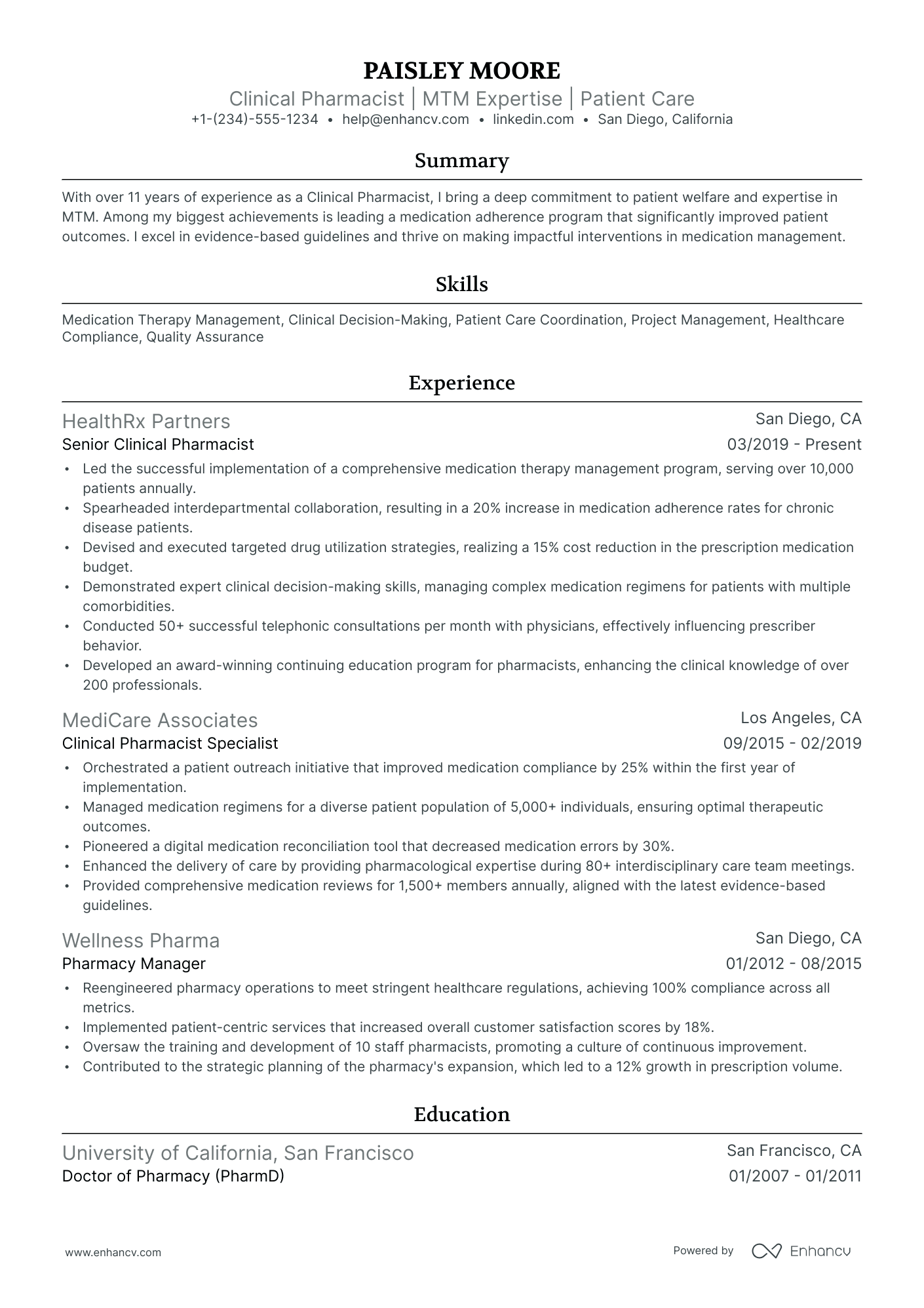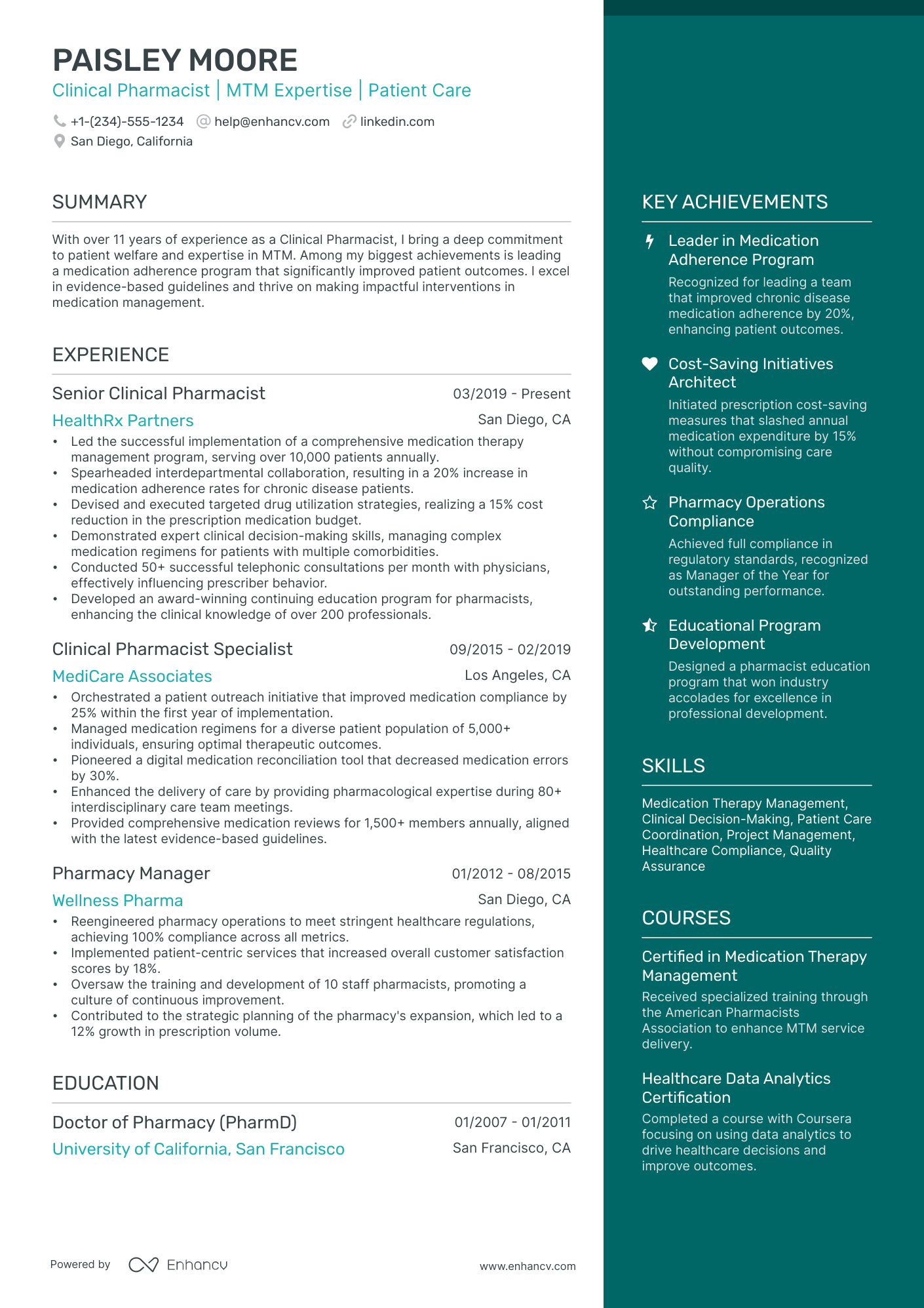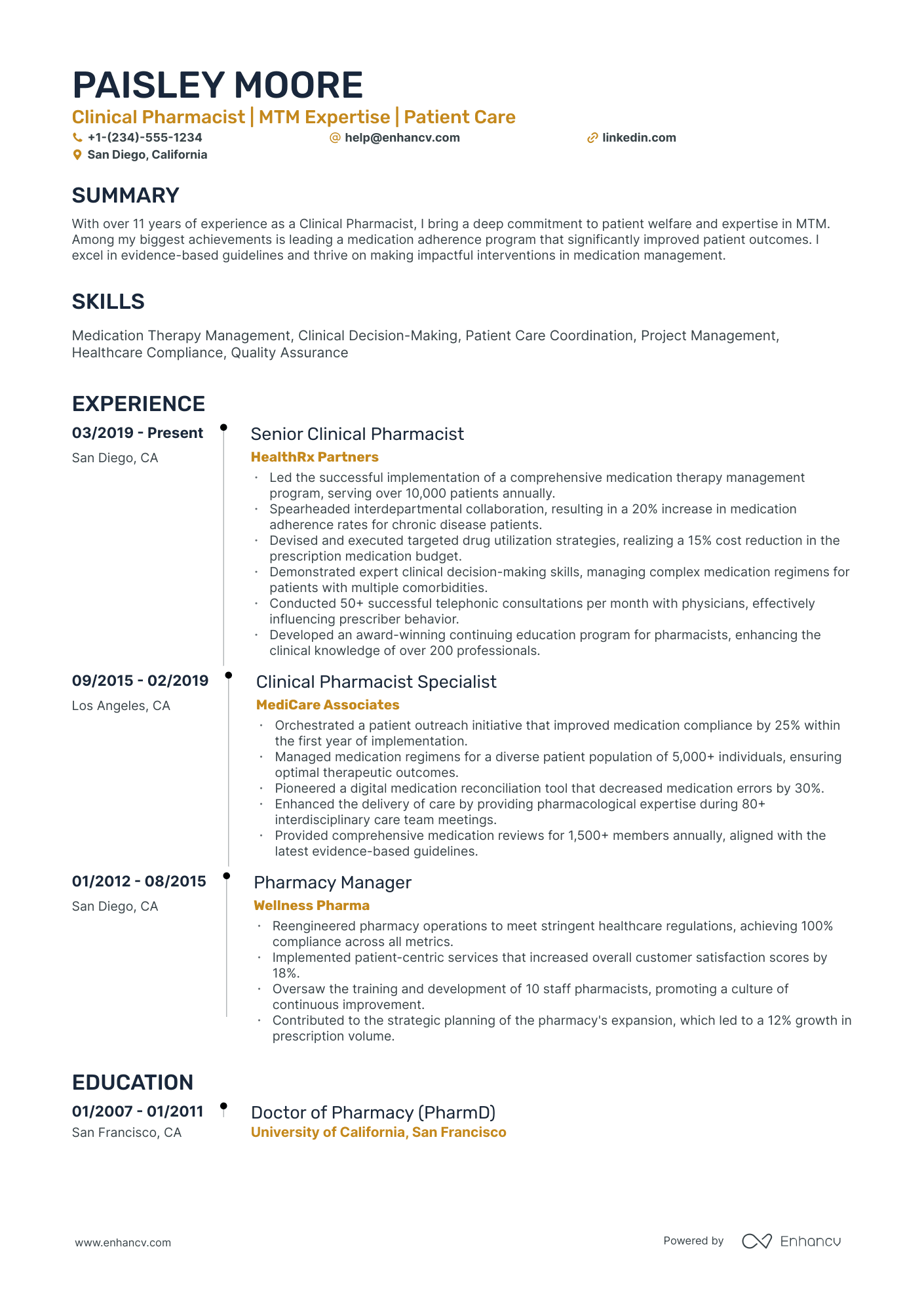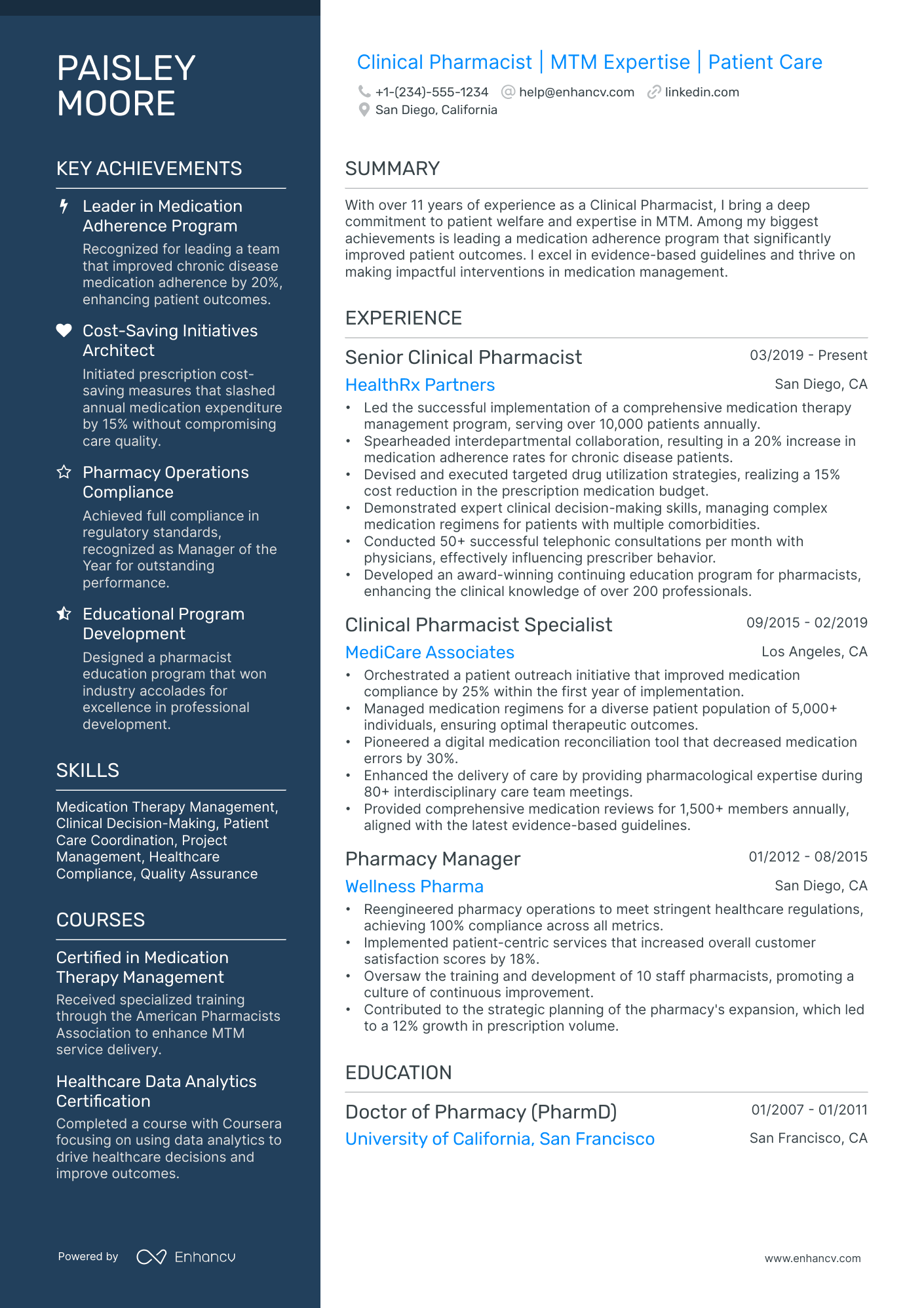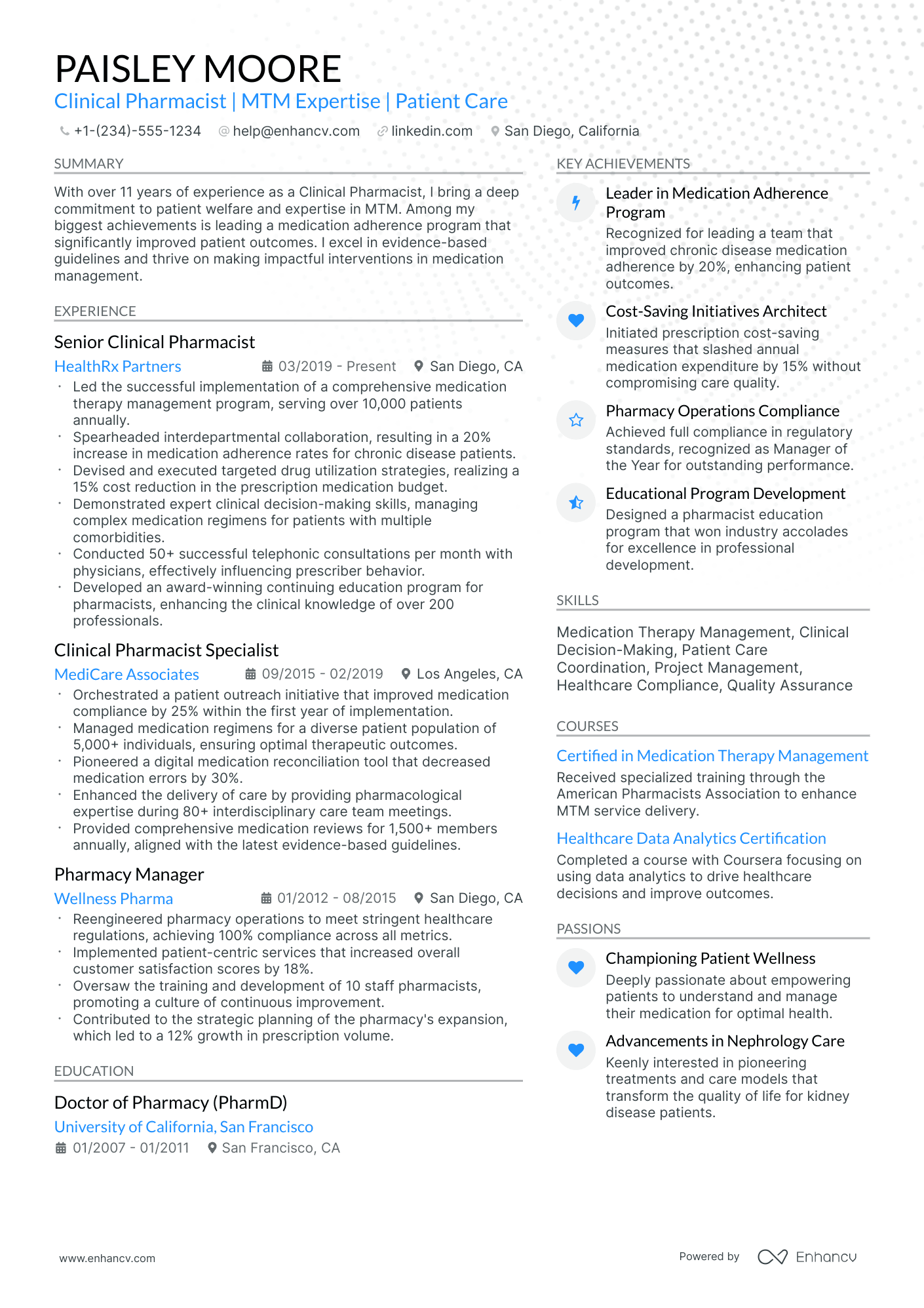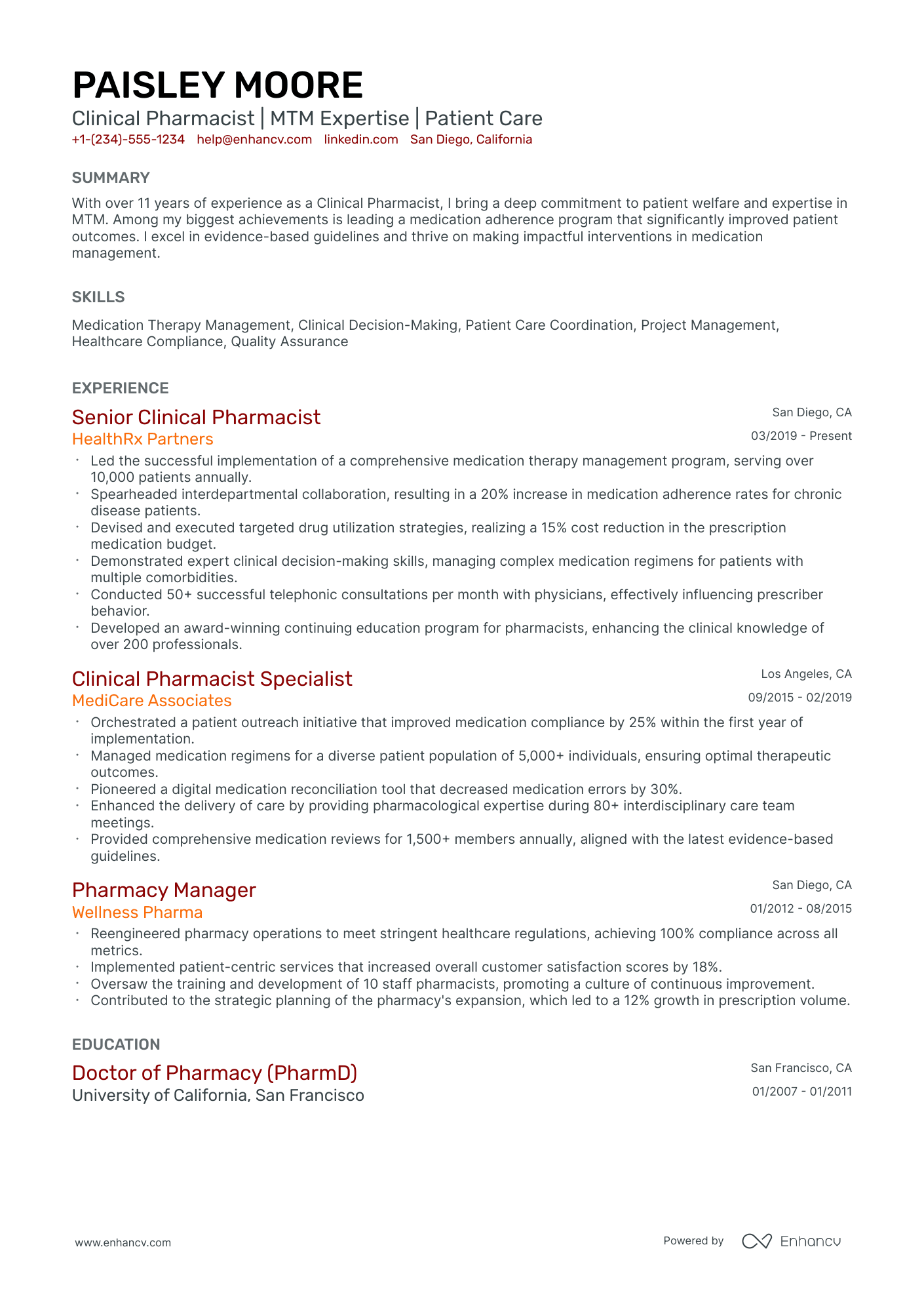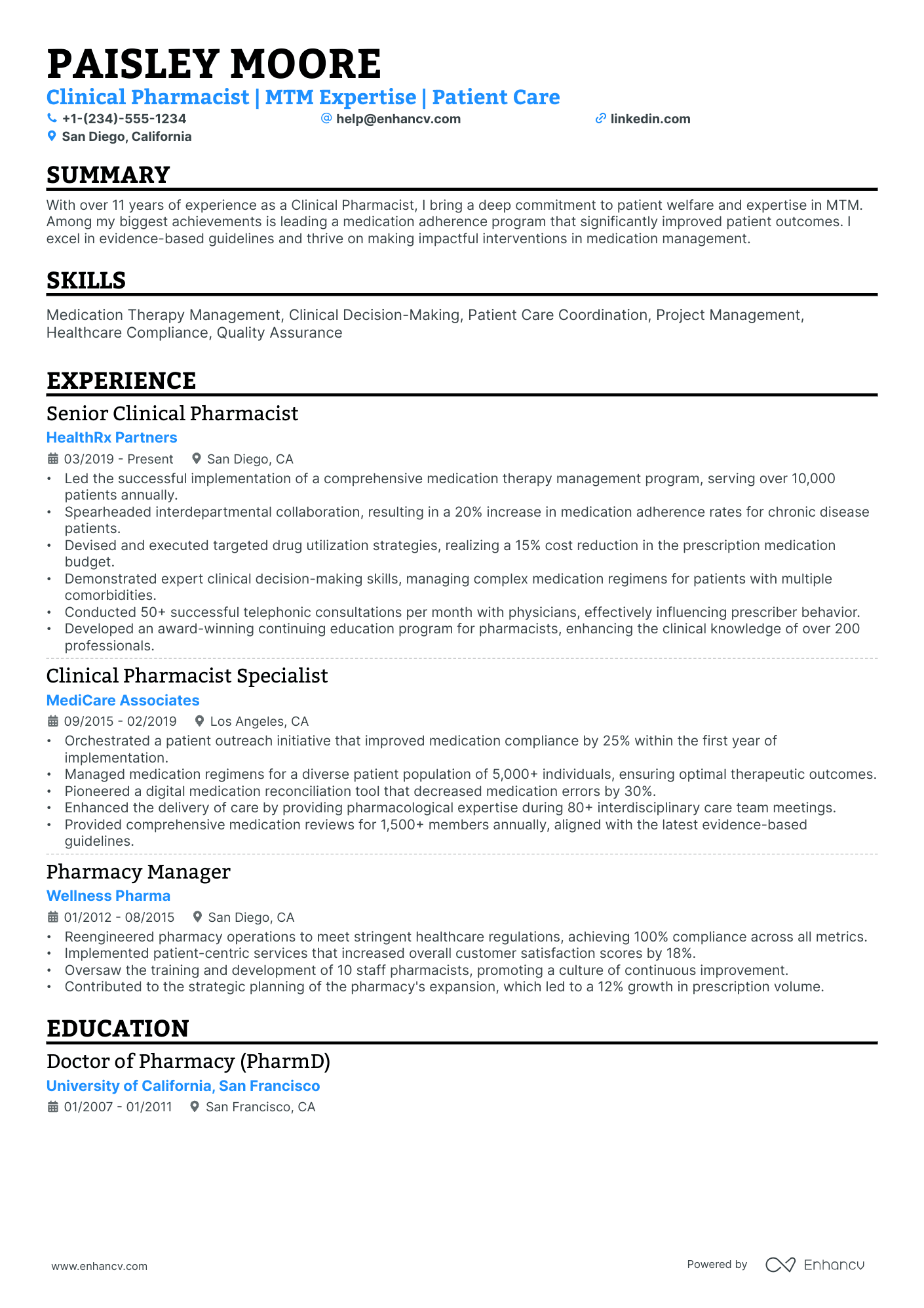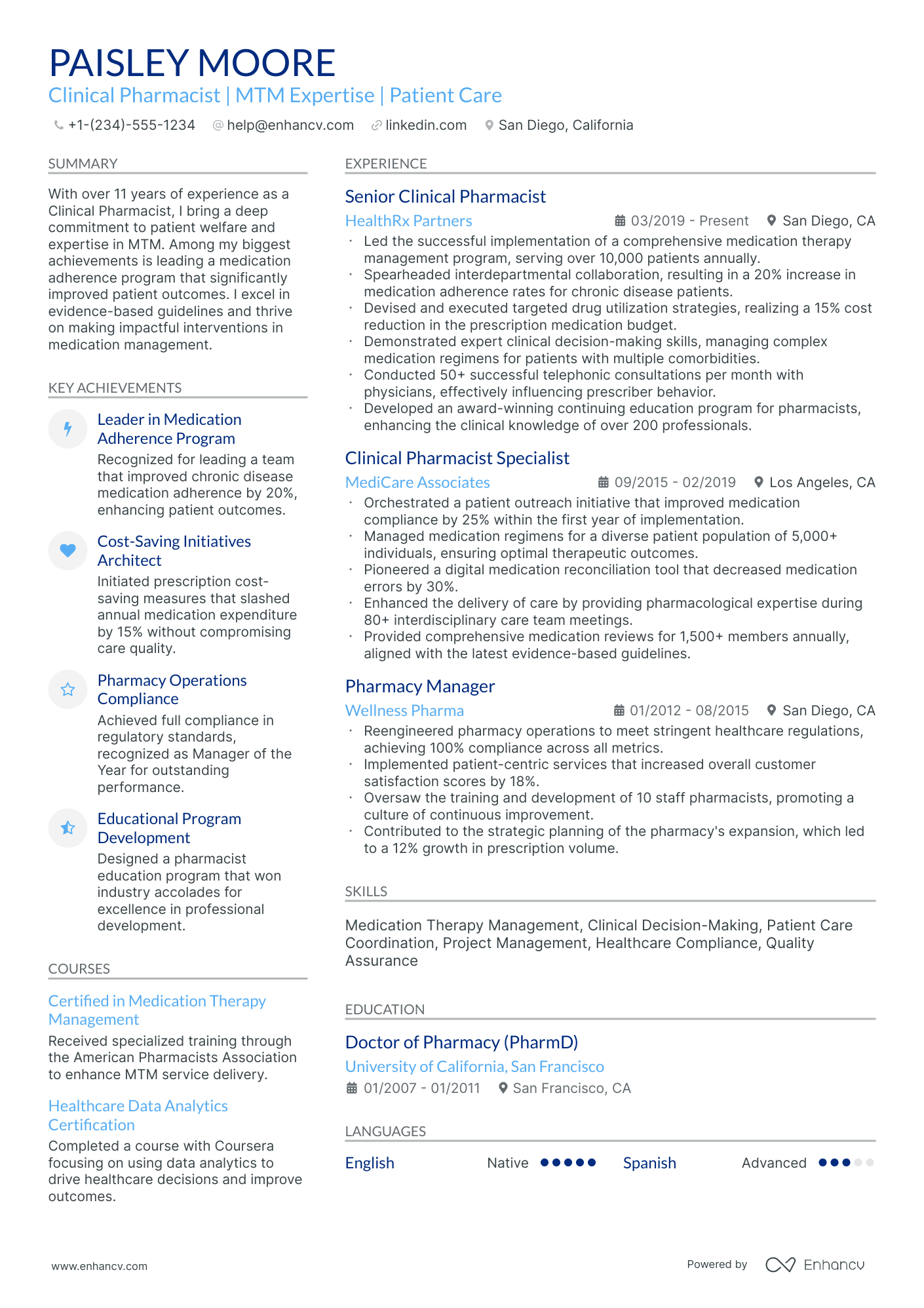As a clinical pharmacist, you might find it challenging to effectively showcase your breadth of medication knowledge and patient-care expertise on a concise resume. Our guide provides targeted advice to help you distill your extensive experience into impactful, clear language that highlights your valuable skills to potential employers.
- Which sections do you need to include in your resume to meet recruiters' requirements;
- How to write your clinical pharmacist resume experience section - even if you have don't have little to no work experience;
- Real-life professional examples to guide you how to write the most important clinical pharmacist resume sections;
- Adding even more sections so your clinical pharmacist resume stands out with professionalism and your personality.
We've also selected some of the best (and most relevant) resume guides for the clinical pharmacist role you're applying for:
- Community Pharmacist Resume Example
- Ob Gyn Medical Assistant Resume Example
- Dental Nurse Resume Example
- Au Pair Resume Example
- Nursing Student Resume Example
- Home Health Aide Resume Example
- Assistant Nurse Resume Example
- Travel Nurse Resume Example
- Pediatric Dental Assistant Resume Example
- Psychiatrist Resume Example
Creating the best clinical pharmacist resume format: four simple steps
The most appropriate clinical pharmacist resume format is defined by precision and a systematic approach. What is more, it should reflect upon how your application will be assessed by recruiters. That is why we've gathered four of the most vital elements to keep in mind when designing your resume:
- It's all about presenting how your experience or skills align with the job. Use the reverse-chronological resume format , if your expertise is relevant to the clinical pharmacist role. Otherwise, select the functional skill-based resume format or the hybrid resume format to shift the focus to your skill set.
- Resume header - make sure you've filled out all relevant (and correct) information, like your contact details and link to your portfolio.
- Resume length - unless you've over a decade of applicable expertise in the field, stick with a one-page resume format. If you'd like to present more of your professional experience, go up to two pages.
- Resume file - submit your clinical pharmacist resume in a PDF format to ensure all information stays in the same place.
Adjust your resume layout based on the market – Canadian resumes, for example, may follow a unique format.
Upload & Check Your Resume
Drop your resume here or choose a file. PDF & DOCX only. Max 2MB file size.
PRO TIP
If you failed to obtain one of the certificates, as listed in the requirements, but decide to include it on your resume, make sure to include a note somewhere that you have the "relevant training, but are planning to re-take the exams". Support this statement with the actual date you're planning to be re-examined. Always be honest on your resume.
The key to your clinical pharmacist job-winning resume - present your expertise with these sections:
- A header to make your resume more scannable
- Snapshot of who you are as a professional with your resume soft skills, achievements, and summary or objective
- Job advert keywords in the skills section of your resume
- Resume experience quantifying your past job successes with metrics
- A relevant education, certification, and technical sills section to provide background to your technological/software capabilities
What recruiters want to see on your resume:
- Demonstrated expertise in pharmacotherapy and medication management for complex patient care.
- Experience with clinical guideline development, medication reconciliation, and patient education to ensure safe and effective medication use.
- Proficiency in conducting comprehensive medication reviews and identifying potential drug interactions or contraindications.
- Ability to collaborate with healthcare professionals in a multidisciplinary team to optimize patient outcomes.
- Active pharmacy licensure and completion of a pharmacy residency or board certification in a relevant specialty (e.g., critical care, oncology, ambulatory care).
Guide to your most impressive clinical pharmacist resume experience section
When it comes to your resume experience , stick to these simple, yet effective five steps:
- Show how your experience is relevant by including your responsibility, skill used, and outcome/-s;
- Use individual bullets to answer how your experience aligns with the job requirements;
- Think of a way to demonstrate the tangible results of your success with stats, numbers, and/or percentages ;
- Always tailor the experience section to the clinical pharmacist role you're applying for - this may sometimes include taking out irrelevant experience items;
- Highlight your best (and most relevant) achievements towards the top of each experience bullet.
You're not alone if you're struggling with curating your experience section. That's why we've prepared some professional, real-life clinical pharmacist resume samples to show how to best write your experience section (and more).
- Led the implementation of a novel anticoagulation therapy protocol that improved patient blood management across cardiac surgery cases, enhancing patient outcomes by 18%.
- Spearheaded a cross-departmental team to review medication use processes, effectively reducing medication errors by 24% and aligning with JCAHO standards.
- Developed comprehensive drug monographs and treatment guidelines that were adopted hospital-wide, thus standardizing care and contributing to a reduction in polypharmacy incidences by 15%.
- Orchestrated a pharmacy-led transitional care program that reduced readmission rates for chronic disease patients by 22%, showcasing a commitment to continuity of care.
- Collaborated with healthcare providers to customize and optimize medication plans, achieving a 12% improvement in patient medication adherence rates.
- Facilitated over 30 educational workshops for clinical staff on drug interactions and safe medication practices, improving the overall safety culture within the institution.
- Pioneered a medication therapy management service for outpatient oncology patients, which led to personalized care plans and a 10% increase in patient satisfaction scores.
- Authored and contributed to 5 research papers on pharmacotherapy in oncology care, advancing the hospital's reputation in contemporary oncologic treatment approaches.
- Initiated quarterly medication safety audits, thereby decreasing drug-related complications by 14% and enhancing the overall level of patient care provided.
- Integrated a comprehensive electronic medication management system, leading to 30% faster medication verification times and supporting a technology-forward approach to clinical pharmacy.
- Championed a medication reconciliation initiative for post-operative patients, reducing preventable drug-related adverse events by 27% and improving overall patient recovery trajectories.
- Conducted pilot studies related to genomics and personalized medicine, enhancing treatment efficacy for genetically-diverse populations and contributing to the field of precision medicine.
- Directed the selection and implementation of a state-of-the-art medication dispensing system that ensured 100% compliance with regulatory standards and enabled real-time inventory management.
- Implemented pharmacist-driven protocols for COPD patients, achieving a significant 33% improvement in patient outcomes as evidenced by fewer emergency department visits.
- Developed and led a multidisciplinary stewardship committee focused on antimicrobial use, resulting in a 20% decrease in broad-spectrum antibiotic utilization and promoting responsible prescribing practices.
- Launched an innovative pharmacy informatics program that reduced prescription processing time by 25% while simultaneously enhancing the accuracy of medication data entries.
- Established a successful inter-professional collaboration model with the cardiology department which contributed to a 15% decrease in adverse drug reactions for cardiovascular patients.
- Mentored and supervised a team of 12 junior pharmacists, fostering a learning environment that led to two team members receiving national awards for excellence in clinical pharmacy practice.
- Oversaw the transition to an outpatient anticoagulant service model, enhancing patient compliance and follow-up care which translated into a 40% reduction in related hospitalizations.
- Managed the development of a comprehensive suite of clinical decision support tools that decreased medication processing errors by a significant 36%.
- Provided critical pharmacy expertise during the design and execution of a randomized controlled trial studying the efficacy of new diabetes medications, influencing the hospital's future formulary decisions and patient therapy options.
- Initiated a prescription cost-saving program by negotiating with suppliers, securing generic medication contracts that saved the hospital approximately $1 million annually.
- Guided the integration of pharmacogenetic testing into routine clinical practice, contributing significantly to personalized patient care and reducing severe adverse events by 19%.
- Elevated the institution's clinical pharmacy program by establishing a strategic partnership with a local university, resulting in the creation of a specialized residency program that attracted top-tier talent.
The following content includes information from "O*NET OnLine" by the U.S. Department of Labor, Employment and Training Administration (USDOL/ETA). Used under the CC BY 4.0 license. The data represents the top responsibilities present on the task lists for clinical pharmacist professionals.
Top Responsibilities for Clinical Pharmacist:
- Review prescriptions to assure accuracy, to ascertain the needed ingredients, and to evaluate their suitability.
- Provide information and advice regarding drug interactions, side effects, dosage, and proper medication storage.
- Maintain records, such as pharmacy files, patient profiles, charge system files, inventories, control records for radioactive nuclei, or registries of poisons, narcotics, or controlled drugs.
- Collaborate with other health care professionals to plan, monitor, review, or evaluate the quality or effectiveness of drugs or drug regimens, providing advice on drug applications or characteristics.
- Plan, implement, or maintain procedures for mixing, packaging, or labeling pharmaceuticals, according to policy and legal requirements, to ensure quality, security, and proper disposal.
- Order and purchase pharmaceutical supplies, medical supplies, or drugs, maintaining stock and storing and handling it properly.
- Compound and dispense medications as prescribed by doctors and dentists, by calculating, weighing, measuring, and mixing ingredients, or oversee these activities.
- Advise customers on the selection of medication brands, medical equipment, or healthcare supplies.
- Teach pharmacy students serving as interns in preparation for their graduation or licensure.
- Provide specialized services to help patients manage conditions, such as diabetes, asthma, smoking cessation, or high blood pressure.
Quantifying impact on your resume
- Include the number of medication therapy management sessions conducted to showcase the volume of your patient interactions.
- State the percentage of cost savings achieved through generic drug utilization and formulary management to demonstrate fiscal responsibility.
- Mention the number of healthcare professionals you trained on drug therapy protocols to highlight your leadership and influence.
- List the amount of revenue generated from clinical pharmacy services to illustrate your contribution to the business side of healthcare.
- Specify the percentage increase in patient compliance with medication regimens due to your interventions to show your impact on treatment outcomes.
- Record the number of adverse drug reactions identified and resolved to emphasize your role in improving patient safety.
- Document the rate of error reduction in prescription processing after implementing new verification systems under your guidance.
- Report the number of clinical trials you have supported or managed, which reflects your experience in research and development.
Action verbs for your clinical pharmacist resume
What if my clinical pharmacist experience doesn't match the requirements?
You've just graduated from college and may have no real world job experience . What should you include within your resume then?
Instead of making up information or adding irrelevant past jobs (e.g. your on-campus work during freshman year), you can:
- Shift the focus from your professional experience to your community impact with your volunteer work. This would showcase numerous soft skills you've built over time (e.g. interpersonal communication);
- Highlight the projects you've completed, as part of your coursework, or, on your own. Thus, you will align your technical background with recruiters' requirements;
- Consider spotlighting your transferrable skills. Or, what lessons and talents your current professional and personal experience has taught you and how they could benefit your potential employers;
- Even if you've had a few months of internship experience, that is relevant for the role, make sure to include this. Recruiters do care about the years of experience you happen to have, but, at the end of the day, your profile would also be assessed based on role alignment.
Recommended reads:
PRO TIP
List all your relevant higher education degrees within your resume in reverse chronological order (starting with the latest). There are cases when your PhD in a particular field could help you stand apart from other candidates.
Balancing hard and soft skills in your clinical pharmacist resume
Recruiters indeed pay close attention to the specific hard and soft skills candidates possess. Hard skills refer to technical abilities or your proficiency in technologies, while soft skills are the personal attributes and qualities developed over your lifetime.
If you're unsure about effectively quantifying these skills on your resume, follow our step-by-step guide. It's crucial to first understand the key job requirements for the role. Doing so enables you to accurately list your:
- Hard skills in sections like skills, education, and certifications. Your technical expertise is straightforward to quantify. Most organizations find it sufficient to mention the certificates you've earned, along with your proficiency level.
- Soft skills within your experience, achievements, strengths, etc. Defining interpersonal communication traits in your resume can be challenging. Focus on showcasing the accomplishments you've achieved through these skills.
Remember, when tailoring your clinical pharmacist resume, ensure that the skills you list match exactly with those in the job requirements. For instance, if the job listing specifies "Microsoft Word," include this exact term rather than just "Word" or "MSO."
Top skills for your clinical pharmacist resume:
Pharmacotherapy Management
Medication Therapy Management (MTM)
Clinical Decision Support Systems
Electronic Health Records (EHR)
Drug Utilization Review
Pharmacokinetics and Pharmacodynamics
Drug Interaction Analysis Software
Compounding Techniques
Formulary Management Systems
Patient Management Software
Communication Skills
Critical Thinking
Problem-Solving
Attention to Detail
Empathy
Team Collaboration
Time Management
Adaptability
Patient Education
Ethical Judgment
Next, you will find information on the top technologies for clinical pharmacist professonals from "O*NET OnLine" by the U.S. Department of Labor, Employment and Training Administration (USDOL/ETA). Used under the CC BY 4.0 license.
Top technologies for Clinical Pharmacist’s resume:
- eClinicalWorks EHR software
- Epic Systems
- Microsoft PowerPoint
- Healthprolink MedAtlas
- Recordkeeping software
PRO TIP
Highlight any significant extracurricular activities that demonstrate valuable skills or leadership.
Your academic background: should you include your education and certifications on your clinical pharmacist resume?
Adding relevant education and certifications to your clinical pharmacist resume is beneficial, whether you're an experienced candidate or just starting in the field.
Featuring your higher education degree that aligns with the role demonstrates your commitment to the industry. On your clinical pharmacist resume, include the start and graduation dates, followed by the name of the institution that awarded your degree.
Regarding certifications, it's wise to list those most relevant to the role or that have contributed to your array of crucial technical or personal traits. Be sure to include the name of the certificate and the awarding institution.
If uncertain about which certifications to feature prominently on your clinical pharmacist resume, refer to our compiled list of the most in-demand ones for guidance.
The top 5 certifications for your clinical pharmacist resume:
- Board Certified Pharmacotherapy Specialist (BCPS) - Board of Pharmacy Specialties (BPS)
- Board Certified Oncology Pharmacist (BCOP) - Board of Pharmacy Specialties (BPS)
- Board Certified Ambulatory Care Pharmacist (BCACP) - Board of Pharmacy Specialties (BPS)
- Board Certified Infectious Diseases Pharmacist (BCIDP) - Board of Pharmacy Specialties (BPS)
- Board Certified Geriatric Pharmacist (BCGP) - Board of Pharmacy Specialties (BPS)
The content below includes information from "O*NET OnLine" by the U.S. Department of Labor, Employment and Training Administration (USDOL/ETA). Used under the CC BY 4.0 license. The data represents the top associations for clinical pharmacist professionals.
Top US associations for a Clinical Pharmacist professional
- Accreditation Council for Pharmacy Education
- American Association of Colleges of Pharmacy
- American Association of Diabetes Educators
- American Association of Pharmaceutical Scientists
- American College of Clinical Pharmacy
PRO TIP
If you're in the process of obtaining your certificate or degree, list the expected date you're supposed to graduate or be certified.
Recommended reads:
Writing the clinical pharmacist resume summary or objective: achievements, keywords, dreams, and more
Deciding on whether to include a resume summary or resume objective should entirely depend on your career situation.
If you have:
- Plenty of relevant achievements you'd like to bring recruiters' focus to, make use of the resume summary. Ensure each of your achievements is quantified with concrete proof (e.g. % of cases solved).
- Less applicable experience, utilize the resume objective. Within the objective include a few noteworthy, past successes, followed up by your professional dreams.
As a bonus, you could define in either your clinical pharmacist resume summary or objective what makes you the perfect candidate for the role.
Think about your unique hard and soft skills that would make your expertise even more important to the job.
These clinical pharmacist professionals have completely covered the formula for the ideal resume introduction:
Resume summaries for a clinical pharmacist job
- With over 10 years of dedicated experience as a clinical pharmacist in fast-paced hospital settings, I have honed a robust skill set that includes expert-level knowledge of medication therapy management and clinical pharmacokinetics. I am particularly proud of leading a drug cost-saving initiative that saved the hospital $200K annually.
- After a successful five-year tenure in biopharmaceutical research, I am transitioning to clinical pharmacy to apply my extensive knowledge of drug development and clinical trials. My background has equipped me with a unique perspective on patient medication management and the critical importance of accurate drug dispensing.
- As a former healthcare consultant with a decade of experience, my transition into the clinical pharmacy domain is fueled by a passion for direct patient care and medication safety. My consultancy background provides me with exceptional analytical skills and a deep understanding of healthcare systems, benefiting medication management and optimization.
- A seasoned critical care pharmacist boasting 15 years in the field, my expertise encompasses developing and implementing evidence-based pharmaceutical care plans and mentoring junior staff. My most notable accomplishment includes redesigning the antimicrobial stewardship program, which led to a 40% reduction in multi-drug resistant infections.
- Eager to embark on a career as a clinical pharmacist, I bring forth a fresh and determined outlook, recently enriched by an accelerated Doctor of Pharmacy (PharmD) program. I am committed to using my newly acquired up-to-date knowledge and innovative thinking to improve patient outcomes and support healthcare teams.
- As a recent PharmD graduate with intern experience at community and hospital pharmacies, I am driven to apply my knowledge of pharmacotherapy and patient counseling. My objective is to provide exceptional care while learning from seasoned pharmacists to further my expertise in clinical drug management and administration.
Average salary info by state in the US for clinical pharmacist professionals
Local salary info for Clinical Pharmacist.” Source: My Next Move, National Center for O*NET Development. Accessed 10/15/2024
| State | Average Salary (in USD) |
|---|---|
| US National Average | $136,030 |
| California (CA) | $160,950 |
| Texas (TX) | $134,880 |
| Florida (FL) | $134,500 |
| New York (NY) | $134,360 |
| Pennsylvania (PA) | $135,640 |
| Illinois (IL) | $135,120 |
| Ohio (OH) | $132,710 |
| Georgia (GA) | $131,440 |
| North Carolina (NC) | $135,370 |
| Michigan (MI) | $134,660 |
Recruiters' favorite additional clinical pharmacist resume sections
When writing your clinical pharmacist resume, you may be thinking to yourself, " Is there anything more I can add on to stand out? ".
Include any of the below four sections you deem relevant, to ensure your clinical pharmacist resume further builds up your professional and personal profile:
Key takeaways
Writing your clinical pharmacist resume can be a structured and simple experience, once you better understand the organization's requirements for the role you're applying to. To sum up, we'd like to remind you to:
- Always select which experiences, skills, and achievements to feature on your resume based on relevancy to the role;
- In your resume summary, ensure you've cherry-picked your top achievements and matched them with the job ad's skills;
- Submit your clinical pharmacist resume as a one or two-page long document at the most, in a PDF format;
- Select industry leading certifications and list your higher education to highlight you have the basis for technical know-how;
- Quantify your people's skills through various resume sections (e.g. Strengths, Hobbies and interests, etc.) to show recruiters how your profile aligns with the organizational culture.
